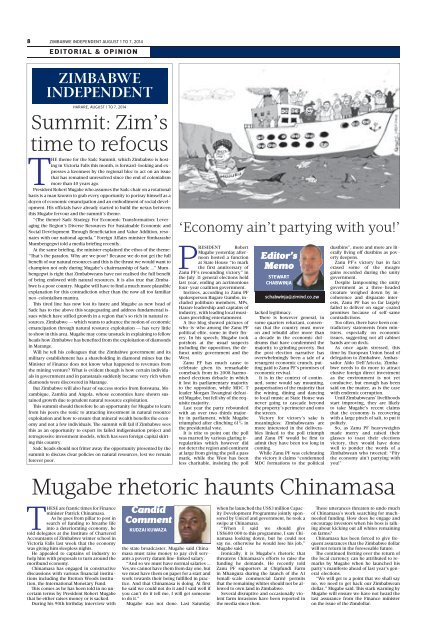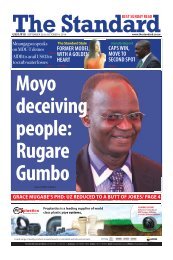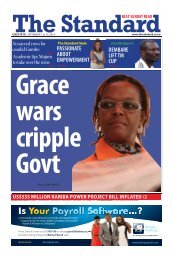Create successful ePaper yourself
Turn your PDF publications into a flip-book with our unique Google optimized e-Paper software.
8<br />
ZimbAbwE indEpEndEnt August 1 to 7, 2014<br />
editorial & opinion<br />
Zimbabwe<br />
independent<br />
HARARE, August 1 to 7, 2014<br />
Summit: Zim’s<br />
time to refocus<br />
THE theme for the Sadc Summit, which Zimbabwe is hosting<br />
in Victoria Falls this month, is forward-looking and expresses<br />
a keenness by the regional bloc to act on an issue<br />
that has remained unresolved since the end of colonialism<br />
more than 40 years ago.<br />
President Robert Mugabe who assumes the Sadc chair on a rotational<br />
basis is a man known to grab every opportunity to portray himself as a<br />
doyen of economic emancipation and an embodiment of social development.<br />
His officials have already started to build the nexus between<br />
this Mugabe fervour and the summit’s theme.<br />
“(The theme) Sadc Strategy For Economic Transformation: Leveraging<br />
the Region’s Diverse Resources For Sustainable Economic and<br />
Social Development Through Beneficiation and Value Addition, resonates<br />
with our national agenda,” Foreign Affairs minister Simbarashe<br />
Mumbengegwi told a media briefing recently.<br />
At the same briefing, the minister explained the ethos of the theme:<br />
“That’s the paradox. Why are we poor? Because we do not get the full<br />
benefit of our natural resources and this is the thrust we would want to<br />
champion not only during Mugabe’s chairmanship of Sadc ...” Mumbengegwi<br />
is right that Zimbabweans have not realised the full benefit<br />
of being endowed with natural resources. It is also true that Zimbabwe<br />
is a poor country. Mugabe will have to find a much more plausible<br />
explanation for this contradiction other than the now all too familiar<br />
neo-colonialism mantra.<br />
This tired line has now lost its lustre and Mugabe as new head of<br />
Sadc has to rise above this scapegoating and address fundamental issues<br />
which have stifled growth in a region that’s so rich in natural resources.<br />
Zimbabwe — which wants to advance the notion of economic<br />
emancipation through natural resource exploitation — has very little<br />
to show in this area. Mugabe may come unstuck in explaining to fellow<br />
heads how Zimbabwe has benefited from the exploitation of diamonds<br />
in Marange.<br />
Will he tell his colleagues that the Zimbabwe government and its<br />
military establishment has a shareholding in diamond mines but the<br />
Minister of Finance does not know what happened to revenues from<br />
the mining venture? What is evident though is how certain individuals<br />
in government and in parastatals suddenly became very rich when<br />
diamonds were discovered in Marange.<br />
But Zimbabwe will also hear of success stories from Botswana, Mozambique,<br />
Zambia and Angola, whose economies have shown sustained<br />
growth due to prudent natural resource exploitation.<br />
This summit should therefore be an opportunity for Mugabe to learn<br />
from his peers the tonic to attracting investment in natural resource<br />
exploitation and how to ensure that mineral wealth benefits the economy<br />
and not a few individuals. The summit will fail if Zimbabwe sees<br />
this as an opportunity to export its failed indigenisation project and<br />
retrogressive investment models, which has seen foreign capital skirting<br />
this country.<br />
Sadc heads should not fritter away the opportunity presented by the<br />
summit to discuss clear policies on natural resources, lest we remain<br />
forever poor.<br />
‘economy ain’t partying with you!’<br />
PRESIDENT Robert<br />
Mugabe yesterday afternoon<br />
hosted a function<br />
at State House “to mark<br />
the first anniversary of<br />
Zanu PF’s resounding victory” in<br />
the July 31 general elections held<br />
last year, ending an acrimonious<br />
four-year coalition government.<br />
Invitees, according to Zanu PF<br />
spokesperson Rugare Gumbo, included<br />
politburo members, MPs,<br />
Harare leadership and captains of<br />
industry, with leading local musicians<br />
providing entertainment.<br />
A live blog showed pictures of<br />
who-is-who among the Zanu PF<br />
political elite, some in their finery.<br />
In his speech, Mugabe took<br />
potshots at the usual suspects<br />
including the opposition, the defunct<br />
unity government and the<br />
West.<br />
Zanu PF has much cause to<br />
celebrate given its remarkable<br />
comeback from its 2008 harmonised<br />
elections debacle in which<br />
it lost its parliamentary majority<br />
to the opposition, while MDC-T<br />
leader Morgan Tsvangirai defeated<br />
Mugabe, but fell shy of the requisite<br />
majority.<br />
Last year the party rebounded<br />
with an over two-thirds majority<br />
in parliament, while Mugabe<br />
triumphed after clinching 61% in<br />
the presidential vote.<br />
It is trite to point out the poll<br />
was marred by various glaring irregularities<br />
which however did<br />
not deter the region and continent<br />
at large from giving the poll a pass<br />
mark, while the West has been<br />
less charitable, insisting the poll<br />
Editor’s<br />
Memo<br />
stewart<br />
chabwinja<br />
schabwinja@zimind.co.zw<br />
lacked legitimacy.<br />
There is however general, in<br />
some quarters reluctant, consensus<br />
that the country must move<br />
on and rebuild after more than<br />
a decade in the economic doldrums<br />
that have condemned the<br />
majority to grinding poverty. But<br />
the post-election narrative has<br />
overwhelmingly been a tale of a<br />
resurgent economic crunch, putting<br />
paid to Zanu PF’s promises of<br />
economic revival.<br />
It is in the context of continued,<br />
some would say mounting,<br />
pauperisation of the majority that<br />
the wining, dining and dancing<br />
to local music at State House was<br />
never going to cascade beyond<br />
the property’s perimeter and onto<br />
the streets.<br />
Victory for victory’s sake is<br />
meaningless: Zimbabweans are<br />
more interested in the deliverables<br />
linked to the poll triumph<br />
and Zanu PF would be first to<br />
admit they have been too long in<br />
coming.<br />
While Zanu PF was celebrating<br />
the victory it claims “condemned<br />
MDC formations to the political<br />
dustbins”, more and more are literally<br />
living off dustbins as poverty<br />
deepens.<br />
Zanu PF’s victory has in fact<br />
erased some of the meagre<br />
gains recorded during the unity<br />
government.<br />
Despite lampooning the unity<br />
government as a three-headed<br />
creature weighed down by incoherence<br />
and disparate interests,<br />
Zanu PF has so far largely<br />
failed to deliver on sugar-coated<br />
promises because of self-same<br />
contradictions.<br />
Too often, there have been contradictory<br />
statements from ministers,<br />
especially on economic<br />
issues, suggesting not all cabinet<br />
hands are on deck.<br />
As once again stressed, this<br />
time by European Union head of<br />
delegation to Zimbabwe, Ambassador<br />
Aldo Dell’Ariccia, Zimbabwe<br />
needs to do more to attract<br />
elusive foreign direct investment<br />
as the environment is not yet<br />
conducive, but enough has been<br />
said on the matter, as is the case<br />
with endemic corruption.<br />
Until Zimbabweans’ livelihoods<br />
start improving, they are likely<br />
to take Mugabe’s recent claims<br />
that the economy is recovering<br />
with a large pinch of salt, to put it<br />
politely.<br />
So, as Zanu PF heavyweights<br />
made merry and raised their<br />
glasses to toast their elections<br />
victory, they would have done<br />
well to ponder the words of a<br />
Zimbabwean who tweeted: “Pity<br />
the economy ain’t partying with<br />
you!”<br />
Mugabe rhetoric haunts Chinamasa<br />
THESE are frantic times for Finance<br />
minister Patrick Chinamasa.<br />
As he goes from pillar to post in<br />
search of funding to breathe life<br />
into a deteriorating economy, he<br />
told delegates at the Institute of Chartered<br />
Accountants of Zimbabwe winter school in<br />
Victoria Falls last week that the economy<br />
was giving him sleepless nights.<br />
He appealed to captains of industry to<br />
help him with proposals to turn around the<br />
moribund economy.<br />
Chinamasa has engaged in constructive<br />
discussions with various financial institutions<br />
including the Bretton Woods institution,<br />
the International Monetary Fund.<br />
This comes as he has been told in no uncertain<br />
terms by President Robert Mugabe<br />
that he either raises money or is sacked.<br />
During his 90th birthday interview with<br />
Candid<br />
Comment<br />
kudzai kuwaza<br />
the state broadcaster, Mugabe said Chinamasa<br />
must raise money to pay civil servants<br />
a poverty datum line-linked salary.<br />
“And so we must have normal salaries ...<br />
Yes,we cannot have them from day one, but<br />
we must have them on paper for a start and<br />
work towards their being fulfilled in practice.<br />
And that Chinamasa is doing. At first<br />
he said we could not do it and I said well if<br />
you can’t do it tell me, I will get someone<br />
to do it.”<br />
Mugabe was not done. Last Saturday<br />
when he launched the US$3 million Capacity<br />
Development Programme jointly sponsored<br />
by Unicef and government, he took a<br />
swipe at Chinamasa.<br />
“When I said we should give<br />
US$600 000 to this programme, I saw Chinamasa<br />
looking down, but he could not<br />
say no, otherwise he would lose his job,”<br />
Mugabe said.<br />
Ironically, it is Mugabe’s rhetoric that<br />
threatens Chinamasa’s efforts to raise the<br />
funding he demands. He recently told<br />
Zanu PF supporters at Chipfundi Farm<br />
in Mhangura during the launch of the A1<br />
(small-scale commercial farm) permits<br />
that the remaining whites should not be allowed<br />
to own land in Zimbabwe.<br />
Several disruptive and occasionally violent<br />
farm invasions have been reported in<br />
the media since then.<br />
These utterances threaten to undo much<br />
of Chinamasa’s work searching for muchneeded<br />
funding. How does he engage and<br />
encourage investors when his boss is talking<br />
about kicking out all whites remaining<br />
on farms?<br />
Chinamasa has been forced to give frequent<br />
assurances that the Zimbabwe dollar<br />
will not return in the foreseeable future.<br />
The continued fretting over the return of<br />
the local currency can be attributed to remarks<br />
by Mugabe when he launched his<br />
party’s manifesto ahead of last year’s general<br />
elections.<br />
“We will get to a point that we shall say<br />
no, we need to get back our Zimbabwean<br />
dollar,” Mugabe said. This stark warning by<br />
Mugabe will ensure we have not heard the<br />
last assurance from the Finance minister<br />
on the issue of the Zimdollar.


















